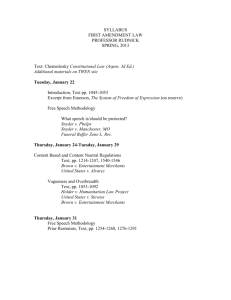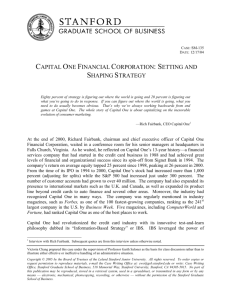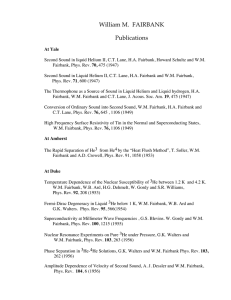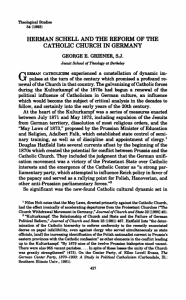HIS_598syl - University of Kentucky
advertisement
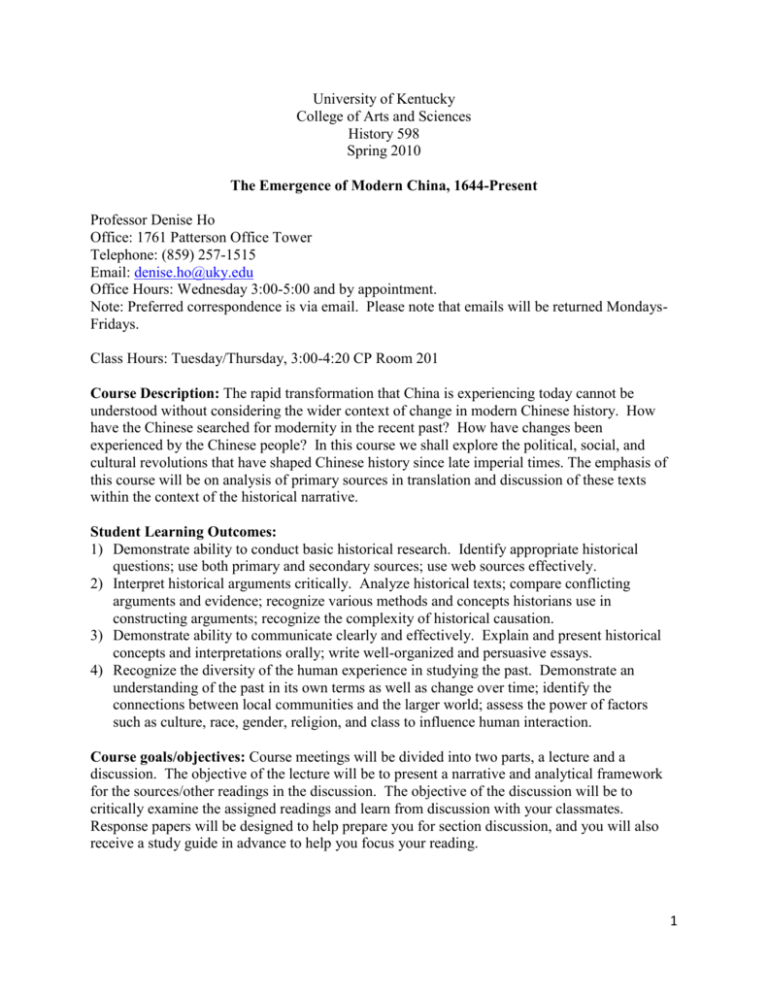
University of Kentucky College of Arts and Sciences History 598 Spring 2010 The Emergence of Modern China, 1644-Present Professor Denise Ho Office: 1761 Patterson Office Tower Telephone: (859) 257-1515 Email: denise.ho@uky.edu Office Hours: Wednesday 3:00-5:00 and by appointment. Note: Preferred correspondence is via email. Please note that emails will be returned MondaysFridays. Class Hours: Tuesday/Thursday, 3:00-4:20 CP Room 201 Course Description: The rapid transformation that China is experiencing today cannot be understood without considering the wider context of change in modern Chinese history. How have the Chinese searched for modernity in the recent past? How have changes been experienced by the Chinese people? In this course we shall explore the political, social, and cultural revolutions that have shaped Chinese history since late imperial times. The emphasis of this course will be on analysis of primary sources in translation and discussion of these texts within the context of the historical narrative. Student Learning Outcomes: 1) Demonstrate ability to conduct basic historical research. Identify appropriate historical questions; use both primary and secondary sources; use web sources effectively. 2) Interpret historical arguments critically. Analyze historical texts; compare conflicting arguments and evidence; recognize various methods and concepts historians use in constructing arguments; recognize the complexity of historical causation. 3) Demonstrate ability to communicate clearly and effectively. Explain and present historical concepts and interpretations orally; write well-organized and persuasive essays. 4) Recognize the diversity of the human experience in studying the past. Demonstrate an understanding of the past in its own terms as well as change over time; identify the connections between local communities and the larger world; assess the power of factors such as culture, race, gender, religion, and class to influence human interaction. Course goals/objectives: Course meetings will be divided into two parts, a lecture and a discussion. The objective of the lecture will be to present a narrative and analytical framework for the sources/other readings in the discussion. The objective of the discussion will be to critically examine the assigned readings and learn from discussion with your classmates. Response papers will be designed to help prepare you for section discussion, and you will also receive a study guide in advance to help you focus your reading. 1 Course Requirements and Grading: Response papers Discussion participation Midterm Examination Two short papers Final Examination 10% 20% 20% 30% 20% Guidelines will be distributed for papers and exams. Weekly response papers of one page will be designed to help facilitate classroom discussion and/or help generate ideas for short papers. Two short papers, 6-8 pages in length, will be designed to encourage analytical writing about sources. Graduate students will be required to do additional readings. Also, instead of two short papers 30% of their grade will be determined by a research paper to be developed in consultation with the instructor. Midterm and final dates TBA. Class Policies: Attendance is required for the participation grade. Absences for illness, family emergency, and official school activities must be documented; there will be no make-up opportunities for unexcused absences. Two unexcused absences will be allowed without penalty. After that, each absence will incur a 10% reduction in the attendance grade. In this course a 90-100% will be an A grade, 80-89% a B grade, 70-79% a C grade, 60-69% a D grade, and below 60% a failing grade. Students will be provided a midterm evaluation. Graduate students cannot receive a D grade, and will receive an E for a grade below 70. All assignments completed by students for this class should be the product of the personal effort of the individual whose name appears on the corresponding assignment. Misrepresenting others’ work as one’s own in the form of cheating or plagiarism is unethical and will lead to those penalties outlined in the University Senate Rules and at the following website: http://www.uky.edu/USC/New/rules_regulations/index.htm. If you have a documented disability that requires academic accommodations, please see the instructor as soon as possible during scheduled office hours. In order to receive accommodations in this course, you must provide me with a Letter of Accommodation from the Disability Resource Center (Room 2, Alumni Gym, 257-2754, jkarnes@email.uky.edu) for coordination of campus disability services available to students with disabilities. The university, college, and department have a commitment to respect the dignity of all and to value differences among members of our academic community. The students and the instructor have the responsibility for ensuring that all academic discourse occurs in a context of respect and civility. 2 Required Readings: The following books are available at the UK Bookstore, and the books that are also at the Young Library have been placed on reserve. Textbook: 1) Fairbank, John King and Merle Goldman. China: A New History. Harvard, 2006. Sourcebooks: 2) De Bary, Wm. Theodore and Richard Lufrano, eds. Sources of Chinese Tradition: From 1600 Through the Twentieth Century. Vol. 2, 2nd Edition. Columbia, 2000. 3) Cheng, Pei-kai, Michael Lestz, and Jonathan D. Spence. The Search for Modern China: A Documentary Collection. Norton, 1999. 4) Schell, Orville and David Shambaugh, eds. The China Reader: The Reform Era. Vintage, 1999. Other Required Readings: 5) Chen Ruoxi, The Execution of Mayor Yin and Other Stories from the Great Proletarian Cultural Revolution. Indiana, 2004. This book is available as an e-book from Young Library. 6) Lu Xun, Selected Stories of Lu Xun. Trans. Gladys Yang. Beijing Foreign Languages Press, 2000. 7) Course readings on Blackboard. Week 1 Thursday January 14: Introduction to the Course Week 2 Tuesday January 19: Qing China Reading: Fairbank, Chapter 9 (187-205) Discussion Reading: Bo Yang, “The Ugly Chinaman,” Sources, 565-568 Tu Wei-ming, “Manifesto for a Reappraisal of Sinology and the Reconstruction of Chinese Culture,” Sources, 550-558 Thursday January 21: Qing China in Crisis Reading: Fairbank, Chapter 10 (206-216) Discussion Reading: Lin Zexu, Sources, 202-206 Lord Palmerston’s Declaration of War, Search, 123-127 Self-Strengthening Movement Documents, Sources, 233-249 Week 3 Tuesday January 26: Reform and Revolution Reading: Fairbank, Chapters 11 and 12 (217-254) Discussion Reading: “Radical Reform at the End of the Qing,” Sources, 254-279, 284-298 Zou Rong, Search, 197-202 Tongmenghui Revolutionary Proclamation, Search 202-206 Wuchang Uprising and Abdication Edict, Search, 206-213 3 Thursday January 28: The New Republic Discussion Reading: Sun Yatsen, Sources, 320-329 Week 4 Tuesday February 2: May Fourth and New Culture Reading: Fairbank, Chapter 13 (257-278) Discussion Reading: “The Spirit of the May Fourth Movement,” Blackboard. Lu Xun, “Call to Arms,” “Medicine,” “Diary of a Madman,” and “My Old Home.” Thursday February 4: City in Republican China Web assignment: Digital Shanghai Week 5 Tuesday February 9: Countryside in Republican China Discussion reading: Mao Dun, “Spring Silkworms,” Blackboard. “North China Famine,” Search, 247-250 Thursday February 11: The Nationalist Party and the Nanjing Decade Reading: Fairbank, Chapter 14 (279-293) Discussion Reading: “Accounts of the New Life Movement,” Search, 294-303 Chiang Kai-shek, “Essentials of the New Life Movement,” and “China’s Destiny,” Sources, 340-347 Week 6 Tuesday February 16: Origins and Development of the Communist Movement Reading: Fairbank, Chapter 15 (294-311) Discussion Reading: Mao Zedong Writings, Sources, 406-425. Thursday February 18 Reading: Fairbank, Chapter 16 (312-330) Discussion Reading: Liu Shaoqi, “How to be a Good Communist,” Sources, 427-432 Mao Zedong, The Rectification Campaign, Sources, 432-449 Week 7 Tuesday February 23: World War II and Civil War Reading: Fairbank, Chapter 17 (331-342) Discussion Reading: “Japan at War and Chiang’s Reply,” Search, 315-324 “Radio Address by Wang Jingwei,” Search, 331-333 “Proclamation of the PLA,” Search, 347-349 4 Thursday February 25: China Stands Up: Social Revolution and Nation Building Reading: Fairbank, Chapter 18 (345-367) Discussion Reading: China and the Soviet Union (Source, 452-455) Industrialization and First Five-Year Plan (Sources, 455-457) “Land Reform,” Blackboard Week 8 Tuesday March 2: The Great Leap Forward Reading: Fairbank, Chapter 19 (368-382) Discussion Reading: Hundred Flowers and Anti-Rightist Campaign Documents (Search, 386-399) “On the Correct Handling of Contradictions among the People” (Sources, 459-464) Great Leap Documents, Search, 404-411 Thursday March 4: The Cultural Revolution Reading: Fairbank, Chapter 20 (383-405) Discussion Reading: “The Future Direction of the Cultural Revolution” (Search, 424-432) “Red Guard Accounts,” Blackboard. Week 9 Tuesday March 9: The Cultural Revolution and Aftermath Discussion Reading: Chen Ruoxi, “The Execution of Mayor Yin,” “Mao Zedong is a Rotten Egg,” “Night Duty,” and “The Big Fish.” Thursday March 11: Midterm Spring Break Week 10 Tuesday March 23: Morning Sun (in-class film) Thursday March 25: No class, instructor at conference Week 11 Tuesday March 30: Post-Mao Reforms Reading: Fairbank, Chapter 21 (406-451) Discussion Reading: Deng Xiaoping, “Build Socialism with Chinese Characteristics” (Search, 507-510) Zhao Ziyang, “Advance Along the Road of Socialism with Chinese Characteristics” (Schell and Shambaugh, 50-77) Thursday April 1: The Experience of the Reforms Film: One Village in China Week 12 Tuesday April 6: Democracy Wall 5 Discussion Reading: Wei Jingsheng, “Democracy: The Fifth Modernization” (Schell, 165-174) Fang Lizhi, “Democracy, Reform, and Modernization” (Schell, 175-181) Deng Xiaoping, “Taking a Clear-Cut Stand Against Bourgeois Liberalization” (Schell, 182-185) Thursday April 8: The Crisis of Tian’anmen Square Discussion Reading: Documents on Tiananmen (Schell, 79-102 AND 186-214) Documents on Tiananmen (Search, 487-506) Week 13 Tuesday April 13: Taiwan’s Twentieth Century Discussion Reading: Chiang Kai-shek, “The Evolution of Constitutional Democracy in Taiwan,” (Sources, 347-350) Jiang Zemin, “Continue to Promote the Reunification of China,” (Schell, 496-504) Thursday April 15: China and Ethnic Minorities Discussion Reading: “Tibet: Its Ownership and Human Rights Situation,” Blackboard. “The Dalai Lama on China, Hatred, and Optimism,” (Schell, 489-492) Week 14 Tuesday April 20: Issues in Development: Economic and Political Change Discussion Reading: “Building an Economic Superpower,” (Schell, 300-344) Thursday April 22: Issues in Development: City and Countryside Discussion Reading: “My Life as a Migrant Worker,” Blackboard “Peasants in the Cities,” Blackboard People’s Daily, “Strengthening Management Over the Floating Population,” (Schell, 373 -375) Week 15 Tuesday April 27: China in the World: Politics and Foreign Relations Discussion Reading: “Military,” and “China and the World,” (Schell, 431-487) Thursday April 29: The World in China: Global Culture in China Discussion Reading: Ha Jin, “After Cowboy Chicken Came to Town,” Blackboard. Yan Yunxiang, “Of Hamburger and Social Space: Consuming McDonald’s in Beijing,” Blackboard. Final Exam: Tuesday May 4 at 3:30 p.m. 6






